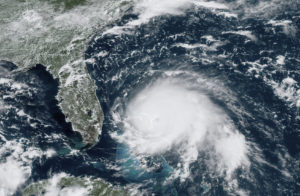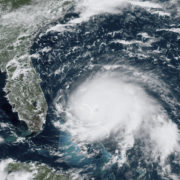
National Oceanic and Atmospheric Administration (NOAA) image of Hurricane Dorian taken Sunday, Sept. 1, 2019, at 17:00 UTC.
Even though we currently have sunny skies, many courts in Florida are closed today due to the threat of Hurricane Dorian (Specifically, the Second and Third Districts are closed today, and the Fourth and Fifth Districts are closed today and tomorrow, with the First and Florida Supreme Court still open as of this writing. How does that affect court deadlines? The short answer: In Florida state courts, you won’t know until the storm is over, so don’t count on a deadline moving. And in Federal Court, the courthouse being closed does not mean you can’t file, so your best bet is to meet any deadline today. Here’s the rules-geek long answer:
Deadlines in Florida State Courts
An emergency closure does not count as a “Court Holiday†under Florida Rules of Judicial Administration Rule 2.514(a)(6)(B) — the Courts are not calling it a “holiday,†and doing so probably has personnel implications that Court administration doesn’t want to deal with. However, the Florida Supreme Court generally issues administrative orders extending deadlines in the affected counties. Right now, the Florida Supreme Court’s emergency page states:
After a storm, orders will be issued by the Chief Justice retroactively extending deadlines in storm-damaged areas. Attorneys and others who missed legal deadlines or hearing dates in areas hard-hit by a hurricane will be protected by these orders, which will be issued once the courts in these areas reopen. They will be posted on our Administrative Orders page when issued.
(This from the Florida Supreme Court Emergency Page as of noon on September 3, 2019). As of this writing, there are no such orders in place, since the threat is not yet over. Check the Court’s administrative orders emergency page for updates. But also, we have not actually been hit so far, so I would be concerned that the Court is not going to ultimately extend deadlines for all. Even with Courts closed, meet all deadlines today, or timely seek extensions. The Florida appellate courts, in particular, are generous with timely-requested enlargements, so don’t hesitate to ask the Court for them.
But what about deadlines that are not normally allowed to be extended? Rule 1.090 states that, even for good cause, a Court:
may not extend the time for making a motion for new trial, for rehearing, or
to alter or amend a judgment; making a motion for relief from a judgment under
rule 1.540(b); taking an appeal or filing a petition for certiorari; or making a
motion for a directed verdict.
We did this analysis for Hurricane Matthew, so check out our prior post on that one.
Deadlines in Federal Courts
The Federal Rules of Appellate Procedure state that when calculating deadlines computed as days:
if the period would end on a Saturday, Sunday, or legal holiday, the period continues to run until the same time on the next day that is not a Saturday, Sunday, or legal holiday.
Federal Rule of Appellate Procedure 26(a)(2)(C). The Federal rules have an additional helpful provision expressly addressing “Inaccessibility” of the Clerk’s Office:
(3) Inaccessibility of the Clerk’s Office. Unless the court orders otherwise, if the clerk’s
office is inaccessible:
(A) on the last day for filing under Rule 26(a)(1), then the time for filing is extended
to the first accessible day that is not a Saturday, Sunday, or legal holiday; or
Federal Rule of Appellate Procedure 26(a)(3). But remember, a closure of the physical building does not make the clerk’s office inaccessible. For example, the Middle District of Florida website currently states:
UPDATE: 7:45 p.m. | Monday, September 2, 2019
On Tuesday, September 3, 2019, the Jacksonville, Ocala, and Orlando divisions are closed, and the Fort Myers and Tampa divisions are open.
On Wednesday, September 4, 2019, the Jacksonville division is closed, and the Fort Myers, Ocala, Orlando, and Tampa divisions are open.
CM/ECF remains available. The website will be updated if additional closures are required.
And the Eleventh Circuit does not even mention the hurricane on its website as of this writing, but since all filings are supposed to be made through ECF or through Atlanta, any “inaccessibility” argument won’t get very far.
Requesting Extensions After the Fact
Remember that if you miss a deadline in most courts, you have a higher burden to prove entitlement to the extension. Both state and federal courts are going to require a showing of good cause and excusable neglect. So meet your filing deadlines today, or at the very least get extension request on file before the deadline passes.



